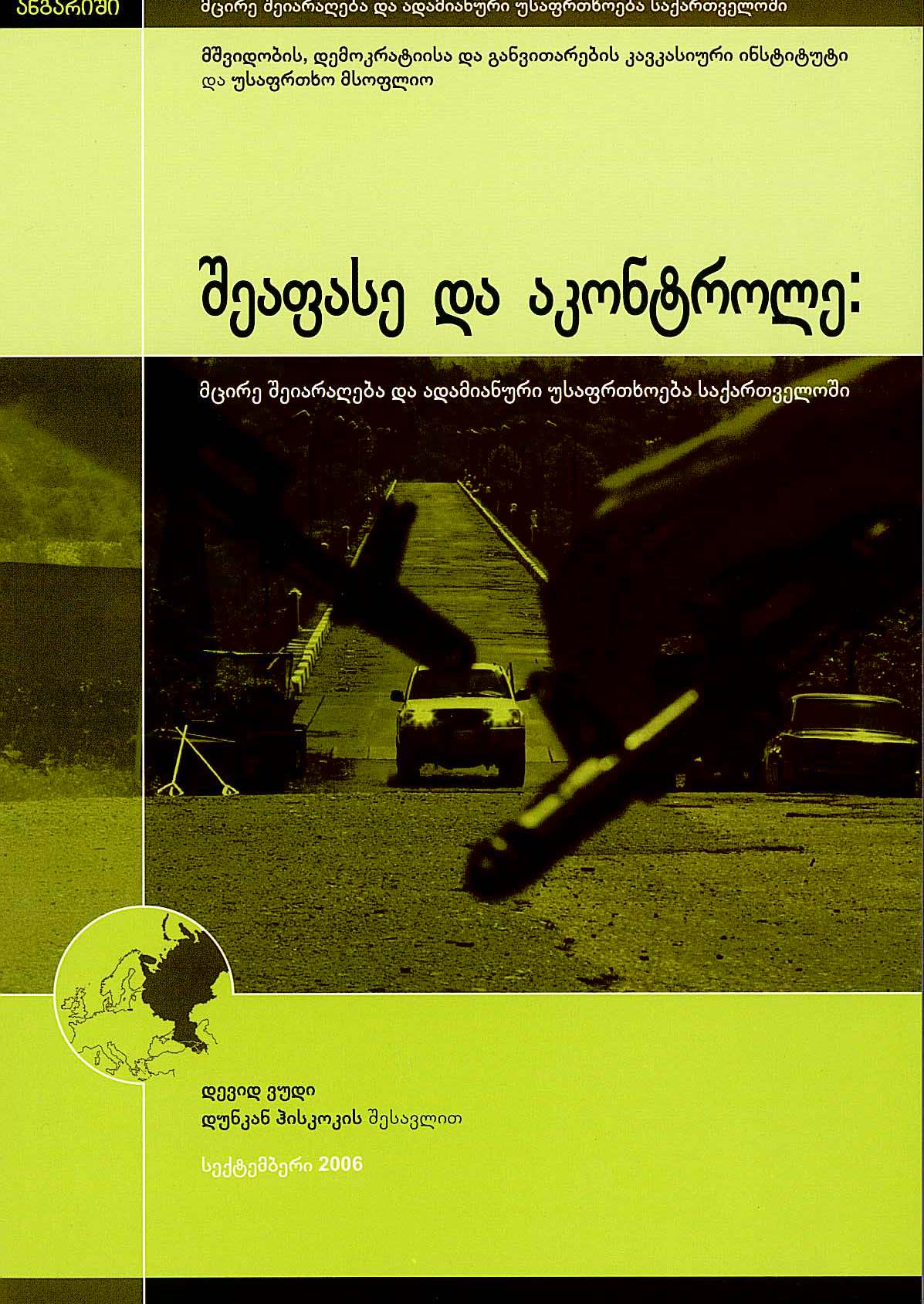არიღი: სექტემბერი, 2006
. Taking stock: small arms and human security in Georgi
. დევიდ ვუდი (უსაფრთხო მსოფლიო), შესავალი – დუნკან ჰისკოკი (კიევის პოლიტიკის შემსწავლელი საერთაშორისო ცენტრი)
პროექტი და დონორი: უსაფრთხო მსოფლიოსა და კავკასიური ინსტიტუტის ერთობლივი პროექტი; დაფინანსებულია გაერთიანებული სამეფოს გლობალური კონფლიქტების პრევენციის ფონდის მიერ
. .
.: 121 (ინგლისური ), 130 (ქართული)
© Saferworld
მოკლე შინაარსი
Taking stock: small arms and human security in Georgiწარმოადგენს მსუბუქი შეიარაღებისა და ადამიანთა უსაფრთხოების გამოკვლევის შედეგს, რომელიც ჩაატარეს არასამთავრობო ორგანიზაციებმა უსაფრთხო მსოფლიომ (ბრიტანეთის გაერთიანებული სამეფო) და მშვიდობის, დემოკრატიისა და განვითარების კავკასიურმა ინსტიტუტმა (საქართველო).
ეს ანგარიში მოიცავს მრავალ სფეროს: ქვეყანაში მსუბუქ შეიარაღებაზე საკუთრებას, მის კანონიერ და უკანონო გამოყენებას, პიროვნებებზე, საზოგადოებასა და მთავრობაზე მის გავლენას, ხალხის დამოკიდებულებას შეიარაღებისა და უსაფრთხოების მიმართ და სახელმწიფო დაწესებულებების შესაძლებლობებს მსუბუქი შეიარაღების გავრცელებისა და მისი უკანონო გამოყენების გასაკონტროლებლად.
ეს გამოკვლევა გრძელდებოდა შვიდი თვის მანძილზე – 2005 წლის დეკემბრიდან 2006 წლის ივნისამდე. გამოყენებული იყო მრავალი მეთოდი: რაოდენობრივი სოციოლოგიური გამოკითხვა მთელი სახელმწიფოს მასშტაბით (აფხაზეთისა და სამხრეთ ოსეთის გარდა), რომელშიც მონაწილეობა მიიღო 1 300-მა რესპონდენტმა; 14 ფოკუს ჯგუფის დისკუსია; ინტერვიუ 50-ზე მეტ მნიშვნელოვან ოფიციალურ და გავლენიან პირთან; ოფიციალური მონაცემებისა და მედიის ანგარიშთა განხილვა.
წინამდებარე ანგარრიში განკუთვნილია პოლიტიკის შემქმნელთათვის, რათა დაეხმაროს მათ საქართველოში დღეს არსებული მსუბუქი შეიარაღების პრობლემის გადაჭრაში. გამოკვლევის ფარგლებში მოეწყო რამდენიმე საკონსულტაციო შეხვედრა, რამაც საშუალება მისცა საქართველოს მთავრობის წარმომადგენლებს გაეკეთებინათ კომენტარი გამოკვლევის შედეგებზე. მათი შეხედულებები გამოკვლევის ბოლო ანგარიშშია გადმოცემული.
Date: September 2006 Title: Taking stock: small arms and human security in Georgia Author(s): David Wood (Saferworld), introduction by Duncan Hiscock (International Centre for Policy Studies in Kyiv) Project and donor: Joint project of the Saferworld and the CIPDD, funded by the UK government’s Global Conflict Prevention Pool Languages: English, Georgian Pages: 121 (English), 130 (Georgian) © Saferworld Description: The publication presents the findings of research conducted on small arms and light weapons (SALW) and human security issues in Georgia by the non-governmental organizations Saferworld (UK) and the Caucasus Institute for Peace, Democracy and Development (CIPDD, Georgia). The report is comprehensive in scope, considering the ownership of small arms in the country, their use and misuse, their impact on individuals, communities and the state, public attitudes and perceptions towards arms and security, and the capacity of state institutions to control the proliferation and misuse of small arms. The research for this survey was undertaken during a seven-month period from December 2005 to June 2006. A variety of methods were used during the research, including a nationwide household survey of 1,300 respondents (excluding Abkhazia and South Ossetia), 14 focus group discussions, interviews with more than 50 key officials and opinion-formers and a review of official data and media reports. The report is intended as a practical reference tool to aid policy makers in developing effective responses to the outstanding small arms problems facing Georgia at this time. To this end, periodic consultation meetings were organised as part of the research process so that officials from the Georgian Government might review preliminary research findings and comment on them. The views expressed during these consultations are reflected in the final research report. Although this survey analyzed the impact on arms proliferation and security of the two areas of Georgia's internationally recognized territory that remain outside the control of the central Government - Abkhazia and South Ossetia - it is focused primarily on those areas currently under Tbilisi's control. This is purely because of a variety of practical difficulties related to undertaking such research in these areas during


